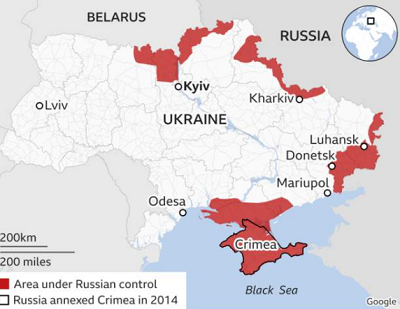JERUSALEM POST STAFF, REUTERS
Fierce fighting in the Kyiv area * Russian forces frustrated by resistance * Casualties continue to climb * NATO allies send aid to Ukraine
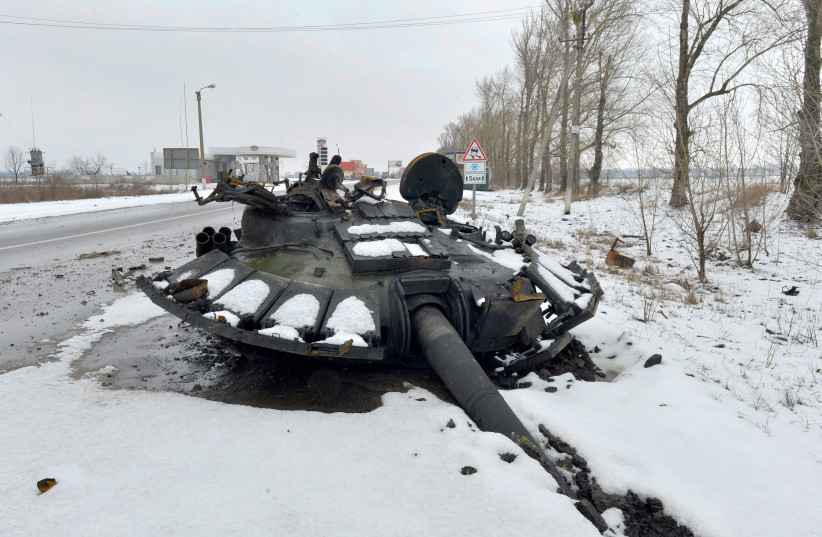 A fragment of a destroyed Russian tank is seen on the roadside on the outskirts of Kharkiv on February 26, 2022, following the Russian invasion of Ukraine. / (photo credit: SERGEY BOBOK/AFP via Getty Images)
A fragment of a destroyed Russian tank is seen on the roadside on the outskirts of Kharkiv on February 26, 2022, following the Russian invasion of Ukraine. / (photo credit: SERGEY BOBOK/AFP via Getty Images)
Fighting between Russian and Ukrainian forces entered its fourth day on Sunday as Russian forces continued to push into the Ukrainian capital of Kyiv and the city of Kharkiv in the northeast.
Russian forces advanced over the weekend towards Ukraine’s major cities, but on Sunday morning the Ukrainian Armed Forces claimed that the Russian military movement had slowed due to the need to replenish fuel and ammunition.
The Ukrainian military also claimed that enemy troops, mostly young conscripts, are exhausted from the previous military exercises they had participated in just prior to the invasion. They claim that there is desertion and low morale, but this assessment may itself be psychological warfare.
“The main goal of the opponent is to block the capital of our homeland, the city of Kiev, which remains unfulfilled,” said the Ukrainian military.
“Where are all those who promised to capture Kyiv in 72 hours? Where are they?” Ukrainian Defense Minister Oleksii Reznikov said in a Sunday morning statement.
The Battle of Kyiv
A series of blasts were heard to the west of the Ukrainian capital Kyiv’s center on Sunday, minutes after air raid sirens sounded, a Reuters correspondent reported.
Ukrainian media reported explosions and a gunfight in a nearby town.
According to the Ukrainian news website Segodnya.ua, a bridge has been blown up near the town of Bucha west of Kyiv. It was unclear whether it had been bombed by Russian troops or destroyed by the Ukrainian side.
Anton Herashchenko, an advisor to Ukraine’s interior minister, said fighting was underway in Bucha with Russian forces that were trying to advance towards Kyiv.
Gunfire and the sound of explosions echoed through Kyiv on Saturday night as well.
Kyiv’s mayor Vitali Klitschko said on Saturday that there was no major Russian military presence in the capital, but that saboteur groups were active and he was imposing a curfew from Saturday evening until Monday morning. Klitschko, a former world heavyweight boxing champion, later told Germany’s Bild tabloid the city was “nearly encircled.”
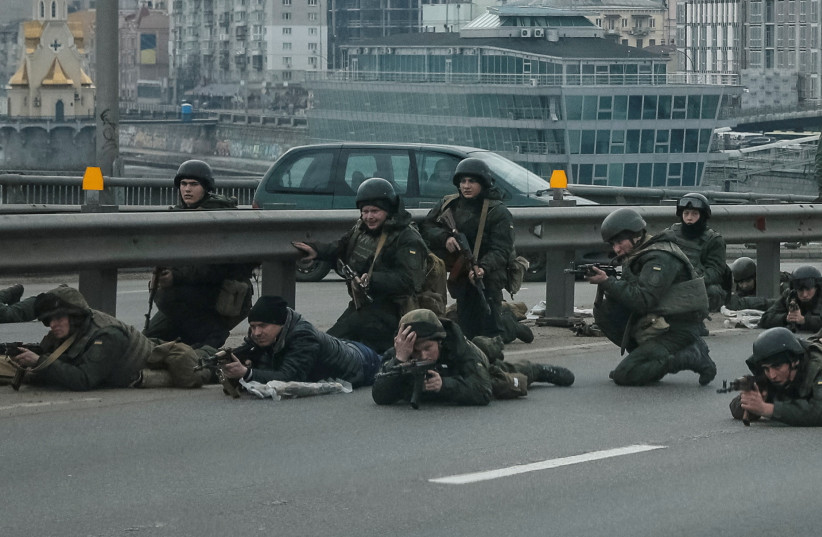 Servicemen of the Ukrainian National Guard take positions in central Kyiv, after Russia launched a massive military operation against Ukraine, February 25, 2022. (credit: REUTERS/GLEB GARANICH)
Servicemen of the Ukrainian National Guard take positions in central Kyiv, after Russia launched a massive military operation against Ukraine, February 25, 2022. (credit: REUTERS/GLEB GARANICH)
Chechen leader Ramzan Kadyrov, a close Putin ally, said on Saturday his fighters were also deployed in Ukraine. He said Russian forces could easily take Kyiv and other large cities but their task was to avoid loss of life.
However, Defense Minister Oleksii Reznikov was defiant on Sunday morning, extolling Ukrainian success in repelling Russian advances in the city.
Instead of seeing Russian forces in the capital, Reznikov said that all he saw was a “heroic army, a civil guard, fearless border guards, selfless rescuers, reliable police officers, tireless medical rescuers who all do their duty.”
Authorities have handed thousands of assault rifles to residents and told citizens to make petrol bombs to help repel the invaders. The government press has also issued instructions on how to sabotage the Russian advance through non-military means.
“I see thousands and thousands of citizens who have taken arms, and have become a level of territorial defense,” Reznikov said Sunday.
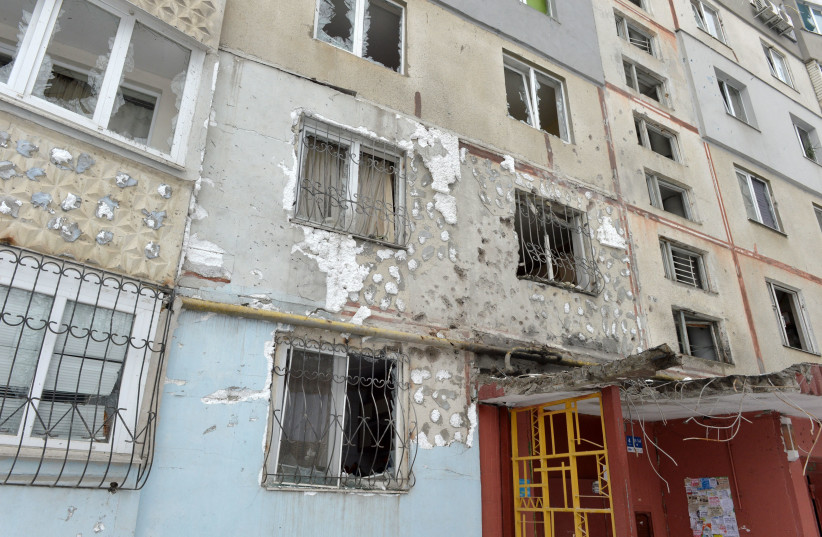 A view of a residential building damaged by recent shelling in Kharkiv on February 26, 2022. (credit: SERGEY BOBOK/AFP via Getty Images)
A view of a residential building damaged by recent shelling in Kharkiv on February 26, 2022. (credit: SERGEY BOBOK/AFP via Getty Images)
Fighting across Ukraine
“The main tactics of the occupiers’ actions remain to move and capture small cities, villages and connecting roads,” the Ukrainian armed forces said on Sunday. “Attempts to take control of major cities were unsuccessful.
“Russian occupants are actively deploying sabotage intelligence groups that destroy civilian infrastructure facilities and kill civilians in major cities,” the statement continued.
Russian troop vehicles were seen on the streets of Ukraine’s northeastern city of Kharkiv on Sunday, Anton Herashchenko, an adviser to Ukraine’s interior minister, wrote on Telegram.
Videos published by Herashchenko and Ukraine’s State Service of Special Communications and Information Protection showed several light military vehicles moving along a street and, separately, a burning tank.
“We know that (Russian forces) have not made the progress that they wanted to make, particularly in the north. They have been frustrated by what they have seen is a very determined resistance,” a US official said, without providing evidence.
Putin on Sunday thanked Russia’s special forces, singling out those who are “heroically fulfilling their military duty” in Ukraine, in a televised address that was also published on the Kremlin website.
Russia and Ukraine casualties and refugees
The Ukrainian Defense Ministry has claimed that as of Sunday morning there were over 3000 Russian soldiers killed in combat, and 200 captured as prisoners of war. A Ukrainian presidential advisor put the number as high as 3500. The ministry also claimed to have destroyed 102 tanks, 540 armored vehicles, 10 aircraft, 18 helicopters, and one anti-aircraft emplacement.
At least 198 Ukrainians, including three children, have been killed and 1,115 people wounded so far in Russia’s invasion, Interfax quoted Ukraine’s Health Ministry as saying. It was unclear whether the numbers comprised only civilian casualties.
Interfax later cited the regional administration in Donetsk, eastern Ukraine, saying 17 civilians had been killed and 73 wounded by Russian shelling.
Zelensky said on Sunday that Russian actions verged on “genocide.”
“This is terror. They are going to bomb our Ukrainian cities even more, they are going to kill our children even more subtly. This is the evil that has come to our land and must be destroyed,” Zelensky said on a short video message.
Russia has not released casualty figures and it was impossible to verify tolls or the precise picture on the ground. Both Ukrainian and Russia casualties are suspect of inflation and downplaying by both sides, for morale and propaganda purposes.
About 100,000 people have crossed into Poland from Ukraine since Thursday, including 9,000 who have entered since 7 a.m. on Saturday, Polish Deputy Interior Minister Pawel Szefernaker said.
Romania announced on Sunday that in cooperation with Ukrainian border authorities, Romanian ambulances will pick up children, pregnant women and the elderly waiting in long queues to cross the border into Romania at the northeastern Siret crossing, speeding up the process.
Humanitarian and military aid to Ukraine
“The world has seen – Ukrainians are strong, Ukrainians are powerful, Ukrainians are brave. So it is not surprising that such people always have more powerful friends than enemies,” Ukrainian President Volodymyr Zelensky said in an address on Saturday night. “During the day, I spoke every hour with the leaders of Ukraine’s friends.”
Zelensky said that he had spoken with the leaders of Italy, India, Azerbaijan and others about how they could aid Ukraine.
NATO countries have been “boosting their support for our partner Ukraine.” NATO said Saturday night.
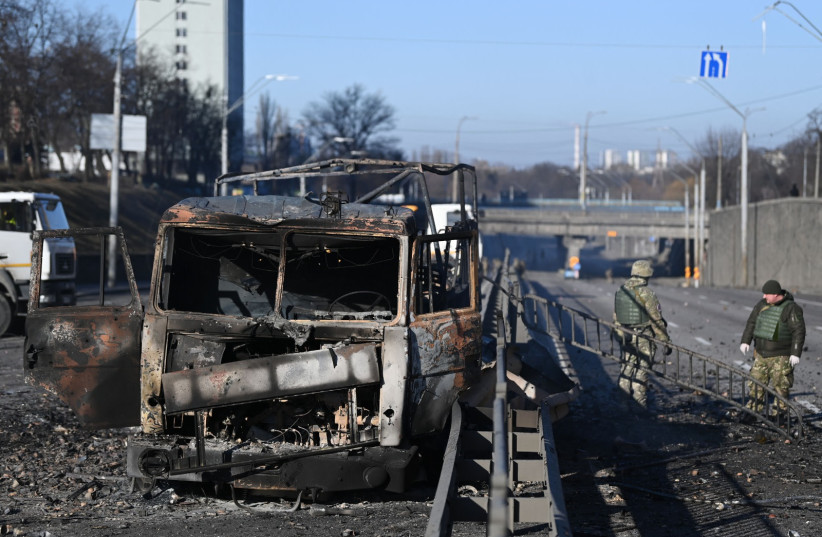 Ukrainian soldiers stand past a burnt Ukrainian army vehicle on the west side of the Ukrainian capital of Kyiv on February 26, 2022. (credit: DANIEL LEAL/AFP via Getty Images)
Ukrainian soldiers stand past a burnt Ukrainian army vehicle on the west side of the Ukrainian capital of Kyiv on February 26, 2022. (credit: DANIEL LEAL/AFP via Getty Images)
“Allies Belgium, Canada, Czech Republic, Estonia, France, Germany, Latvia, Lithuania, Netherlands, Poland, Slovakia, United Kingdom and United States have sent or are approving military aid such as guns, ammo and missiles, including air defense and anti-tank equipment,” NATO said in a Saturday night Instagram post. “Italy is preparing financial support and Spain humanitarian aid. Turkey is deepening defense ties with our Ukrainian partners.”
“We keep our word on defense,” The Czech Defense Ministry said on Sunday morning, sharing a video of a train presumably full of military supplies and headed for Ukraine. “We’re sending machine guns, assault rifles, pistols, ammunition and artillery shells. Further assistance will be approved by the Sunday government.”
Romania said on Sunday that it will send provisions and equipment worth 3 million euros ($3.38 million) to Ukraine and has offered to care for the wounded in military and civilian hospitals, government spokesperson Dan Carbunaru said on Sunday.
Provisions to be sent include fuel, ammunition, bullet-proof vests, helmets, military equipment, food and water, he added.
Ukraine is also receiving financial support from individuals around the world, even as crowdfunding site Patreon closed a campaign raising funds for Ukrainian soldiers and gear over the weekend. The General Staff of the Ukrainian Armed Forces thanked supporters on Sunday morning, saying that they had received 1.160 billion Ukrainian hryvnias, or $39 Million US dollars from supporters, which included 900,000 transactions from personal sources.
Sanctions
Western nations have also announced new sanctions on Russia, including blacklisting its banks and banning technology exports.
One of the biggest results in Zelensky’s eyes was the limited disconnection of SWIFT from some Russian institutions. They have so far stopped short of forcing Russia out of the SWIFT system for international bank payments, though Germany’s foreign and economic ministers and French presidential official indicated on Saturday that such a move may come soon.
“Our diplomats fought around the clock and with inspiration for all European countries to agree on a strong and fair decision to disconnect Russia from the international interbank network. We also have this victory. This is billions and billions of losses for Russia – a concrete price for this vile invasion of our state,” Zelensky said on Saturday night.
Background on the war
After amassing some 190,000 troops to the north, east and south of Ukraine, Putin on Monday signed a decree to recognize two breakaway regions of eastern Ukraine, the Donetsk People’s Republic and the Lugansk People’s Republic, as independent entities in a signing ceremony shown on state television.
On Thursday Russia finally launched what Putin called a “special military operation” after weeks of denying its intention to invade Ukraine. Putin argued that Ukraine, a democratic nation of 44 million people, is an illegitimate state carved out of Russia, a view Ukrainians see as aimed at erasing their more than thousand-year history.
It is unclear what is Putin’s endgame for the conflict.
 Minął kolejny dzień wojny
Minął kolejny dzień wojny